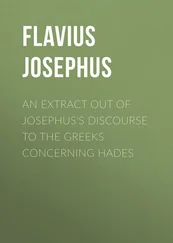Flavius Josephus - The Life of Flavius Josephus
Здесь есть возможность читать онлайн «Flavius Josephus - The Life of Flavius Josephus» — ознакомительный отрывок электронной книги совершенно бесплатно, а после прочтения отрывка купить полную версию. В некоторых случаях можно слушать аудио, скачать через торрент в формате fb2 и присутствует краткое содержание. Жанр: foreign_prose, История, foreign_edu, foreign_antique, на английском языке. Описание произведения, (предисловие) а так же отзывы посетителей доступны на портале библиотеки ЛибКат.
- Название:The Life of Flavius Josephus
- Автор:
- Жанр:
- Год:неизвестен
- ISBN:нет данных
- Рейтинг книги:3 / 5. Голосов: 1
-
Избранное:Добавить в избранное
- Отзывы:
-
Ваша оценка:
- 60
- 1
- 2
- 3
- 4
- 5
The Life of Flavius Josephus: краткое содержание, описание и аннотация
Предлагаем к чтению аннотацию, описание, краткое содержание или предисловие (зависит от того, что написал сам автор книги «The Life of Flavius Josephus»). Если вы не нашли необходимую информацию о книге — напишите в комментариях, мы постараемся отыскать её.
The Life of Flavius Josephus — читать онлайн ознакомительный отрывок
Ниже представлен текст книги, разбитый по страницам. Система сохранения места последней прочитанной страницы, позволяет с удобством читать онлайн бесплатно книгу «The Life of Flavius Josephus», без необходимости каждый раз заново искать на чём Вы остановились. Поставьте закладку, и сможете в любой момент перейти на страницу, на которой закончили чтение.
Интервал:
Закладка:
4. And now I perceived innovations were already begun, and that there were a great many very much elevated in hopes of a revolt from the Romans. I therefore endeavored to put a stop to these tumultuous persons, and persuaded them to change their minds; and laid before their eyes against whom it was that they were going to fight, and told them that they were inferior to the Romans not only in martial skill, but also in good fortune; and desired them not rashly, and after the most foolish manner, to bring on the dangers of the most terrible mischiefs upon their country, upon their families, and upon themselves. And this I said with vehement exhortation, because I foresaw that the end of such a war would be most unfortunate to us. But I could not persuade them; for the madness of desperate men was quite too hard for me.
5. I was then afraid, lest, by inculcating these things so often, I should incur their hatred and their suspicions, as if I were of our enemies' party, and should run into the danger of being seized by them, and slain; since they were already possessed of Antonia, which was the citadel; so I retired into the inner court of the temple. Yet did I go out of the temple again, after Manahem and the principal of the band of robbers were put to death, when I abode among the high priests and the chief of the Pharisees. But no small fear seized upon us when we saw the people in arms, while we ourselves knew not what we should do, and were not able to restrain the seditious. However, as the danger was directly upon us, we pretended that we were of the same opinion with them, but only advised them to be quiet for the present, and to let the enemy go away, still hoping that Gessius [Florus] would not be long ere he came, and that with great forces, and so put an end to these seditious proceedings.
6. But, upon his coming and fighting, he was beaten, and a great many of those that were with him fell. And this disgrace which Gessius [with Cestius] received, became the calamity of our whole nation; for those that were fond of the war were so far elevated with this success, that they had hopes of finally conquering the Romans. Of which war another occasion was ministered; which was this:– Those that dwelt in the neighboring cities of Syria seized upon such Jews as dwelt among them, with their wives and children, and slew them, when they had not the least occasion of complaint against them; for they did neither attempt any innovation or revolt from the Romans, nor had they given any marks of hatred or treacherous designs towards the Syrians. But what was done by the inhabitants of Scythopolis was the most impious and most highly criminal of all; 6 6 See Jewish War, B. II. ch. 18. sect. 3.
for when the Jews their enemies came upon them from without, they forced the Jews that were among them to bear arms against their own countrymen, which it is unlawful for us to do; 7 7 The Jews might collect this unlawfulness of fighting against their brethren from that law of Moses, Leviticus 19:16, "Thou shalt not stand against the blood of thy neighbor;" and that, ver. 17, "Thou shalt not avenge, nor bear any grudge against the children of thy people; but thou shalt love thy neighbor as thyself;" as well as from many other places in the Pentateuch and Prophets. See Antiq. B. VIII. ch. 8. sect. 3.
and when, by their assistance, they had joined battle with those who attacked them, and had beaten them, after that victory they forgot the assurances they had given these their fellow citizens and confederates, and slew them all, being in number many ten thousands [13,000]. The like miseries were undergone by those Jews that were the inhabitants of Damascus. But we have given a more accurate account of these things in the books of the Jewish war. I only mention them now, because I would demonstrate to my readers, that the Jews' war with the Romans was not voluntary, but that, for the main, they were forced by necessity to enter into it.
7. So when Gessius had been beaten, as we have said already, the principal men of Jerusalem, seeing that the robbers and innovators had arms in great plenty, and fearing lest they, while they were unprovided of arms, should be in subjection to their enemies, which also came to be the case afterward; and, being informed that all Galilee had not yet revolted from the Romans, but that some part of it was still quiet; they sent me and two others of the priests, who were men of excellent characters, Joazar and Judas, in order to persuade the ill men there to lay down their arms, and to teach them this lesson,—That it were better to have those arms reserved for the most courageous men that the nation had [than to be kept there]; for that it had been resolved, That those our best men should always have their arms ready against futurity; but still so, that they should wait to see what the Romans would do.
8. When I had therefore received these instructions, I came into Galilee, and found the people of Sepphoris in no small agony about their country, by reason that the Galileans had resolved to plunder it, on account of the friendship they had with the Romans, and because they had given their right hand, and made a league with Cestius Gallus, the president of Syria. But I delivered them all out of the fear they were in, and persuaded the multitude to deal kindly with them, and permitted them to send to those that were their own hostages with Gessius to Dora, which is a city of Phoenicia, as often as they pleased; though I still found the inhabitants of Tiberias ready to take arms, and that on the occasion following:—
9. There were three factions in this city. The first was composed of men of worth and gravity; of these Julius Capellus was the head. Now he, as well as all his companions, Herod the son of Miarus, and Herod the son of Gamalus, and Compsus the son of Compsus; [for as to Compsus's brother Crispus, who had once been governor of the city under the great king [Agrippa] 8 8 That this Herod Agrippa, the father, was of old called a Great King, as here, appears by his coins still remaining; to which Havercamp refers us.
he was beyond Jordan in his own possessions;] all these persons before named gave their advice, that the city should then continue in their allegiance to the Romans and to the king. But Pistus, who was guided by his son Justus, did not acquiesce in that resolution; otherwise he was himself naturally of a good and virtuous character. But the second faction was composed of the most ignoble persons, and was determined for war. But as for Justus, the son of Pistus, who was the head of the third faction, although he pretended to be doubtful about going to war, yet was he really desirous of innovation, as supposing that he should gain power to himself by the change of affairs. He therefore came into the midst of them, and endeavored to inform the multitude that "the city Tiberius had ever been a city of Galilee, and that in the days of Herod the tetrarch, who had built it, it had obtained the principal place, and that he had ordered that the city Sepphoris should be subordinate to the city Tiberias; that they had not lost this preeminence even under Agrippa the father, but had retained it until Felix was procurator of Judea. But he told them, that now they had been so unfortunate as to be made a present by Nero to Agrippa, junior; and that, upon Sepphoris's submission of itself to the Romans, that was become the capital city of Galilee, and that the royal library and the archives were now removed from them." When he had spoken these things, and a great many more, against king Agrippa, in order to provoke the people to a revolt, he added that "this was the time for them to take arms, and join with the Galileans as their confederates [whom they might command, and who would now willingly assist them, out of the hatred they bare to the people of Sepphoris; because they preserved their fidelity to the Romans], and to gather a great number of forces, in order to punish them." And as he said this, he exhorted the multitude, [to go to war;] for his abilities lay in making harangues to the people, and in being too hard in his speeches for such as opposed him, though they advised what was more to their advantage, and this by his craftiness and his fallacies, for he was not unskilful in the learning of the Greeks; and in dependence on that skill it was, that he undertook to write a history of these affairs, as aiming, by this way of haranguing, to disguise the truth. But as to this man, and how ill were his character and conduct of life, and how he and his brother were, in great measure, the authors of our destruction, I shall give the reader an account in the progress of my narration. So when Justus had, by his persuasions, prevailed with the citizens of Tiberias to take arms, nay, and had forced a great many so to do against their wills, he went out, and set the villages that belonged to Gadara and Hippos on fire; which villages were situated on the borders of Tiberias, and of the region of Scythopolis.
Интервал:
Закладка:
Похожие книги на «The Life of Flavius Josephus»
Представляем Вашему вниманию похожие книги на «The Life of Flavius Josephus» списком для выбора. Мы отобрали схожую по названию и смыслу литературу в надежде предоставить читателям больше вариантов отыскать новые, интересные, ещё непрочитанные произведения.
Обсуждение, отзывы о книге «The Life of Flavius Josephus» и просто собственные мнения читателей. Оставьте ваши комментарии, напишите, что Вы думаете о произведении, его смысле или главных героях. Укажите что конкретно понравилось, а что нет, и почему Вы так считаете.












